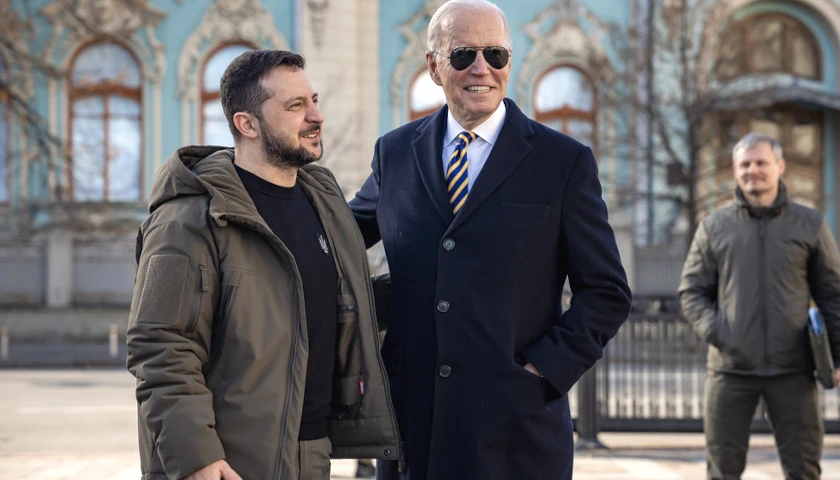by Jake Smith
President Joe Biden struck a major agreement with Ukraine this week that builds on his administration’s push to involve the U.S. in the nation’s security, further expanding Washington’s commitments to Kyiv.
Biden attended the Group of Seven (G7) summit in Italy this week and signed a deal with Ukraine, which includes a 10-year commitment to Ukraine’s defenses and fast-track its eventual accession to NATO. The deal underscores Biden’s growing number of commitments and promises to Kyiv, including loosening weapons restrictions and providing billions in aid, as the U.S. becomes more involved in the ongoing conflict in Eastern Europe.
 The 10-year bilateral agreement announced on Thursday seeks to increase U.S. coordination with Kyiv for future weapons deliveries, bolster Ukraine’s defense capabilities, expand intelligence sharing and “enhance interoperability between our militaries,” according to a readout from the White House. The agreement also aims to move Ukraine closer to its ultimate goal of joining the NATO alliance, of which the Biden administration has been vocally supportive.
The 10-year bilateral agreement announced on Thursday seeks to increase U.S. coordination with Kyiv for future weapons deliveries, bolster Ukraine’s defense capabilities, expand intelligence sharing and “enhance interoperability between our militaries,” according to a readout from the White House. The agreement also aims to move Ukraine closer to its ultimate goal of joining the NATO alliance, of which the Biden administration has been vocally supportive.
“Finally, this agreement accelerates Ukraine’s integration into the European and Atlantic — trans-Atlantic communities,” Biden said at a joint press conference with Zelenskyy on Thursday. “It states that America supports Ukraine’s future — future membership in NATO and recognizes that our security agreement is a bridge to Ukraine’s member- — membership in NATO.”
The Biden administration also recently gave Ukraine the green light to start firing U.S. and Western-provided weapons into limited regions of Russia, a move which the administration previously opposed. The U.S.’ European allies are reportedly now pressuring the Biden administration to further loosen weapons regulations so that Ukraine can strike deeper inside Russian territory, Politico reported on Friday.
No public statements have been made by the administration as to whether this request will be granted, but officials have signaled that U.S. policy is flexible in this regard.
“If you look back over the course of the conflict, you can find a number of areas where we were reluctant to do something and then we did it,” a senior Pentagon official, speaking on anonymity given the sensitive nature of discussions, told Politico on Friday. “So never say never.”
If Ukraine becomes a member of NATO, the U.S. becomes obligated to come to its defenses, as an attack on a NATO country is considered an attack on all alliance members under Article 5 of the treaty. Russia has firmly stated it does not support Ukraine’s accession into NATO, warning of the risk of a global war if it does.
“[Bringing Ukraine into NATO] is pointless and it would do nothing but keep the war going,” retired Lt. Col. Daniel Davis, a national security expert at Defense Priorities and host of the Daniel Davis Deep Dive show, told the DCNF.
And on the Biden administration’s choice to loosen weapons restrictions for Ukraine, Moscow has warned that such policies represent an escalation of the war and pose the threat of dragging the U.S. and NATO allies further into the conflict. Russian President Vladimir Putin has raised the specter of retaliating by providing weapons to its allies to strike Western targets.
“The longer the war goes on, the more likely it is that the terms of any settlement will be more onerous for Ukraine and that the task of reconstructing its economy and infrastructure will be even more difficult,” George Beebe, former CIA analyst and defense expert at the Quincy Institute, told the DCNF about Biden’s G7 deal.
Ukraine’s military capabilities, even with over $70 billion in U.S. weapons aid alone, are lesser than those of Russia’s. Ukraine suffers from a worsening manpower shortage and does not possess the same quality of military equipment and weapons as Russia does. Russia’s military has sustained heavy losses since the war began in 2022 but has gained ground along the Eastern front of the war, exhausting Ukrainian forces and driving their retreat.
The bilateral deal signed on Thursday comes with a caveat — a future U.S. president could choose to withdraw, as the agreement was made executively and not be ratified by Congress, according to Politico. Should Biden lose to former President Trump in the November presidential elections, Trump could use his executive authority to withdraw from the deal.
Trump has said on several occasions he can end the war quickly and negotiate a peace settlement between Russia and Ukraine if reelected as president.
“I’ve recently spoken with one of Trump’s senior foreign policy advisors, and he told me that if Trump wins, he is going to seek a settlement on the best terms he can get, and he has no interest in expanding the war,” Davis told the DCNF.
– – –
Jake Smith is a reporter at Daily Caller News Foundation.



